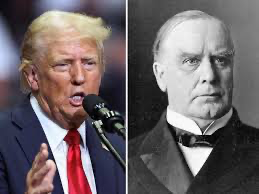President Trump has often invoked former president William McKinley as a model, emphasizing his legacy as a “tariff president ” In the 1890s, McKinley promoted the McKinley Tariff of 1890, which imposed high duties on imported goods. Trump omits a critical part of McKinley’s economic journey: His eventual recognition that free trade and international partnerships would be vital for the nation’s prosperity in a new global economy.
By Ya Libnan Editorial board
Trump’s economic strategy, particularly his reliance on tariffs, has long been a source of controversy. Economists and historians alike agree that tariffs have historically failed to strengthen economies in the long run. Instead, they have led to retaliatory measures from trade partners, higher prices for consumers, and unnecessary economic disruptions. Yet, Trump continues to push tariffs as a solution, ignoring the clear evidence that they do more harm than good.
The Repercussions of a Trade War
A trade war triggered by aggressive tariffs has severe consequences that extend far beyond domestic economic hardship. When countries impose tariffs on each other, it creates a cycle of retaliation, further escalating economic instability. This results in:
- Higher Costs for Consumers – Companies facing increased import costs pass them onto consumers, leading to inflation and reduced purchasing power.
- Economic Slowdown – Businesses dependent on global supply chains face disruptions, leading to reduced investment, layoffs, and economic stagnation.
- Strained Diplomatic Relations – Trade conflicts harm diplomatic ties, making cooperation on broader international issues more difficult.
- Declining Export Competitiveness – Countries affected by tariffs impose their own duties, making American goods less competitive in the global market.
The Danger of Uniting America’s Adversaries
Perhaps the most alarming consequence of Trump’s tariff strategy is the risk of driving America’s adversaries into closer economic and strategic alliances. By aggressively imposing tariffs on traditional allies and rivals alike, the U.S. is inadvertently pushing nations toward economic blocs that exclude American influence. This includes:
- China and Russia Strengthening Ties – U.S. tariffs have pushed China and Russia into closer economic cooperation, increasing trade agreements and financial systems that bypass American influence.
- The Rise of Alternative Trade Alliances – Countries affected by American tariffs are forming their own trade partnerships, such as the Regional Comprehensive Economic Partnership (RCEP) in Asia, reducing reliance on U.S. trade.
- Weakening of the Dollar’s Dominance – As trade wars persist, nations seek alternative currencies for global trade, weakening the dollar’s role as the world’s primary reserve currency.
Splitting the World into Economic Camps
Instead of fostering a unified global economic order, Trump’s tariff policies are accelerating the division of the world into competing economic blocs. This polarization increases the risk of geopolitical instability, making global cooperation on critical issues—such as climate change, security, and economic development—more difficult.
The Path Forward
The most effective way to strengthen the economy is not through protectionist measures but through strategic trade agreements, investment in domestic industries, and fostering innovation. The U.S. should prioritize:
- Rebuilding Trade Alliances – Working with allies to create fair trade agreements that boost economic growth for all parties.
- Encouraging Domestic Innovation – Investing in technology, education, and infrastructure to make American industries more competitive globally.
- Negotiating Rather Than Imposing – Using diplomacy to resolve trade imbalances rather than resorting to tariffs that escalate tensions.
If Trump wants to create long-term economic growth, he must reverse his damaging tariff policies and adopt a more pragmatic approach that fosters global cooperation rather than economic isolation.

